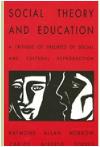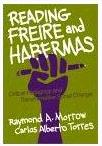Curriculum Vitae: Morrow-CV-2014 Research Despite an often distracting eclecticism that was reinforced by early years of geographic mobility related to the lack of a secure academic position, my research and publications can be summarized in terms of three overlapping areas: (1) an earlier and continuing interest in an ecumenical, post-Marxist conception of critical social theory and research grounded in a critical theory of methodology;(2) a collaborative effort with Carlos Alberto Torres (UCLA) to apply such social theory to the fundamental questions of educational reproduction and transformation from a comparative perspective; and 3) a somewhat later emerging concern with issues of deliberative democratic theory, democratic transition and modernization, especially in relation to Latin American postcoloninal debates about indigenous knowledge and subaltern groups, especially in Mexico. The notion of an ecumenical conception of critical social theory is broader than that of the Critical Theory of the Frankfurt School tradition from Horkeimer, Adorno and Marcuse to Habermas (hence also including Mannheim, Elias, Bourdieu, Foucault, Giddens, critical American pragmatism, etc.), but narrower than the excessively expansive notion of "theory" as "critical theory" found in cultural studies. The difference is that critical social theory insists on a sociological (and anthropological) grounding in empirical methodologies that embrace both social structural/political economic and textual/cultural analysis. Such concerns are synthesized in part in the concept of "interpretive structuralism" that underlies the book Critical Theory and Methodology (Sage,1994) and was later applied to critique of Michael Burawoy's widely cited notion of a "public sociology" (Morrow, 2009b). The publications relating to education have taken two forms. On the one hand, in Social Theory and Education (SUNY Press, )., Carlos Alberto Torres and I present an ambitious review and critique of theories of educational reproduction, including functionalism, varieties of Marxism (e.g., Althusser, Bowles & Gintis,Willis), and the critical theories of Bourdieu, Giroux, Apple, etc. (for a brief recent update, see Morrow, 2014). On the other hand, in Reading Freire and Habermas, we develop a more focused comparison between the German critical theorist Jürgen Habermas (often referred to as the most inluential German social theorist since Max Weber) and the Brazilian adult educator and founder of critical pedagogy, Paulo Freire, the most influential "Southern theorist" from Latin America. The book gives particular attention to the broad convergence and extensive complementarity between these two critical social theories, despite their origins respectively in "Northern" and "Southern Theory". I have recently extended some of these latter themes - especially in relation to questions of Eurocentrism and indigenous knowledge - in a series of anthology chapters (Morrow, 2013a, 2013b, 2009a, 2008). A third topic of research has only emerged in publications more recently, despite a long time interest in social research, cultural studies and democratic transition in Mexico, as evident in my longstanding participation as a member of the international advisory board of the journal Estudios sobre las Culturas Contemporáneas (Universidad de Colima, México). On the one hand, a close examination of the impasse of American-Mexican relations provdes a framework for envisioning the conditions of possibility for a fundamental transformation (Morrow, 2012). On the other hand, a critical theory of deliberative democracy is developed to analyze the failure of neoliberal modernization theories to deal with the historical uniqueness of the Mexican social formation - closely related to the crisis of democratic transition - and the necessary conditions for democratic consolidation (Morrow, 2010). Books Morrow, Raymond A. 1994. Critical Theory and Methodology. Newbury Park and London: Sage. Morrow, Raymond A., and Carlos A. Torres. 1995. Social Theory and Education: A Critique of Theories of Social and Cultural Reproduction. Albany, NY: State University of New York Press. Morrow, Raymond A., and Carlos Alberto Torres. 2002. Reading Freire and Habermas: Critical Pedagogy and Transformative Change. New York: Teacher's College Press, Columbia University. More Recent Publications (with pdf files): 2014 (forthcoming). 'Reproduction Theories". In Encyclopedia of Educational Theory and Philosophy, edited by D. C. Phillips. Sherwood Park, CA and London: Sage Publications. Reproduction Theories 2013a. "Defending Habermas Against Eurocentrism: Latin America and Mignolo's Decolonial Challenge." In Global Perspectives on Habermas, edited by Tom Bailey, 117-136. London: Routledge. Defending Habermas 2013b. "Rethinking Freire's 'Oppressed': A Postcolonial Route to Habermas's Communicative Turn and Theory of Deliberative Democracy." In Paulo Freire's Roots: Toward Historicity in Praxis, edited by Robert Lake and Tricia Kress, 65-87. New York and London: Bloomsbury Academic. Rethinking Freire's Oppressed 2012. "Critique of Mexico-US Relations: Beyond the Contemporary Impasse." In Our North America: Social and Political Issues Beyond NAFTA, edited by Julián Castro-Rea, 231-252. Farnham, UK and Burlington, VT: Ashgate Publishing. Mexican-US Relations 2010. "The Public Sphere and Revolution in Latin America: Mexico and the Challenges of Deliberative Democracy." In Las revoluciones necesarias para América Latina, edited by Salvador Leetoy and Daniel Lemus, 113-141. Guadalajara: 2009. "Rethinking Burawoy's Public Sociology: A Post-Empiricist Critique." In The Handbook of Public Sociology, edited by Vincent Jeffries, 47-70. Lantham, MD: Rowman & Littlefield. Mexico & Deliberative Democracy 2009a. "Habermas, Eurocentrism and Education: The Indigneous Knowledge Debate." In Habermas, Critical Theory, and Education, edited by Mark Murphy and Ted Fleming, 63-77. London and New York: Routledge. Habermas, Education & Eurocentrism 2009b. "Rethinking Burawoy's Public Sociology: A Post-Empiricist Critique." In The Handbook of Public Sociology, edited by Vincent Jeffries, 47-70. Lantham, MD: Rowman & Littlefield. Rehinking Burawoy 2008. "Paulo Freire, Indigenous Knowledge and Eurocentric Critiques of Development: Three Perspectives." In Social Justice Education for Teachers: Paulo Freire and the Possible Dream, edited by Carlos A. Torres and Pedro Noguera, 81-100. Rotterdam: Sense Publisher. Freire & Indigenous Knowledge |
||


